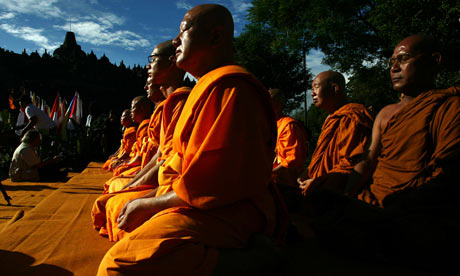Religion
Related: About this forumIs Buddhism a religion?
http://www.theguardian.com/commentisfree/belief/2013/oct/07/is-buddhism-a-religionIn the first part of a new series, we examine why many consider Buddhist practices to be philosophical rather than religious
Michael McGhee
theguardian.com, Monday 7 October 2013 04.00 EDT

Buddhist monks meditate in Magelang, Central Java, Indonesia. Photograph: Ulet Ifansasti/Getty Images
What first attracted me to Buddhism in the years that followed my slow abandonment of formal Christianity wasn't anything intellectual but had to do rather with imagination, with images of liberation. I was struck by the serenity of the figure of the Buddha, its representation of self-possession and calm. There was danger there, the temptation towards a too-easy and precipitate appropriation of a demeanour that depended upon arduous and sometimes unappetising struggle. Nevertheless, Buddhism was attractive and it seemed to be a way of rediscovering something that seemed to be missing, without requiring an entrance fee in the form of religious or metaphysical belief.
I suppose that what was missing was "spirituality". But this raises the question of whether "spirituality" can be extricated from those belief-commitments. Some commentators have pointed out that there is no shortage of metaphysical beliefs in the Buddhist traditions and that its practices and rituals are embedded in worldviews of some complexity and sophistication. They wonder whether Buddhist practices really can be extracted from this environment without damage to their identity, whether the Buddhisms to be found in the contemporary west have become deracinated, cut off from the necessary nourishment of their cultural and metaphysical roots. It may well look like this. Thus, people attest to the therapeutic value of meditation and the NHS is more comfortable with a mindfulness-based psychotherapy than one that makes use of the Christian practice of prayer because it is an efficacious technique with measurable health benefits and it is not "religious". Clients don't need a background of religious belief in order to settle down to a spot of meditation.
Some contemporary groups go out of their way to insist that Buddhism is not "religious" and what they seem to imply is, again, that engaging in its practices doesn't depend upon the belief-subscription. These same groups, however, are also quite traditional in their language and their rituals and this should give us pause as we consider this charge of deracination. It is true that many contemporary Buddhist practitioners have done the same de-mythologising job as a previous generation of Death of God theologians who were themselves accused of rendering the New Testament into an inoffensive and pallid humanism.
But it is one thing to seek to liberate Buddhist practice from unsustainable or unbelievable worldviews and another to reduce it to a mere technique, even one that is therapeutic. The usual culprit is the calming technique that makes it easier to carry out the bombing run or makes one a more sharply predatory capitalist. The reason one might want to say that meditation has been reduced to a technique is that it has lost its essential rootedness as a practice of ethical preparation.
more at link
gopiscrap
(23,765 posts)BlueCaliDem
(15,438 posts)but they have their dogma, too, which makes it a religion.
One example of their entrenched dogma: if a child is born with disabilities, it's because his/her parents have done something wrong and their child is being punished for it. My son's girlfriend says that's why her parents didn't want her to be raised Buddhist but instead chose a more "kinder" religion - Protestant.
el_bryanto
(11,804 posts)Which is that if a child is born with disabilities it's because he or she did something in the last life that merited it. Or, alternatively, I suppose, he or she did really well as a lower creature, but not well enough to be a regular human? At any rate your conditions in life are set by what you did in your previous life.
But there are a lot of different paths in Buddhism so I certainly don't have a full understanding.
Bryant
BlueCaliDem
(15,438 posts)that her parents told her the one I laid out.
She said her parents didn't want their children following their faith because it's a faith full of guilt that might hamper their evolution. This is the explanation she gave me. I'm no expert in Buddhism so I'm not 100% certain her interpretation (or rather, her parents' interpretation) is the correct one. ![]()
el_bryanto
(11,804 posts)Actually many religions do.
And there are a lot of different paths within Buddhism; it's no more monolithic than Christianity.
Also I apologize for using the term Normal Human above - it was a bit insensitive. I mean to say Healthy Human Child?
Bryant
BlueCaliDem
(15,438 posts)But for some strange reason, they believe that Buddhism has more and that's why they urged their children to become Christians.
And as an aside, the actual term you used was "regular human", but I understood what you meant since I read it in context of your entire post. Nothing insensitive about it from my p.o.v. ![]()
cbayer
(146,218 posts)which I highly recommend.
It's about a climbing expedition in Tibet in which a group of blind children are guided.
They start out the story by talking about how these children have been scorned and abused and abandoned their entire lives because they are felt to be responsible for their own blindness.
I was very surprised by this.
Bosso 63
(992 posts)rug
(82,333 posts)just us
(105 posts)each of these "isms" are messages and practices to help the evaluation of human being to spiritual being. Each is like class in school,each have a earthly message and spiritual message. The spiritual being can learn from each and evolve.